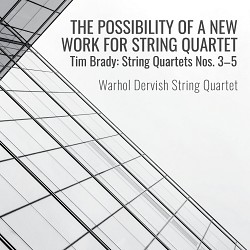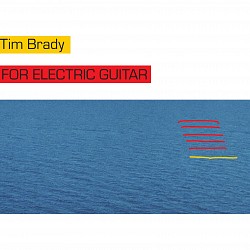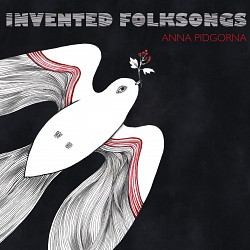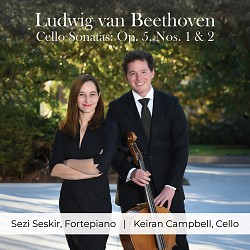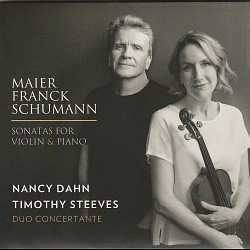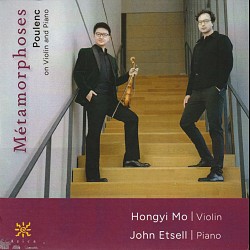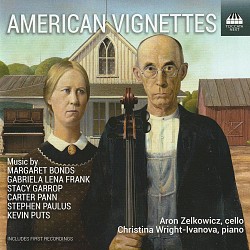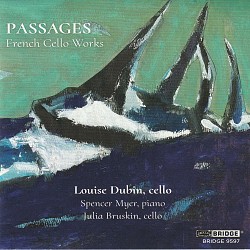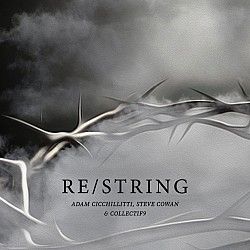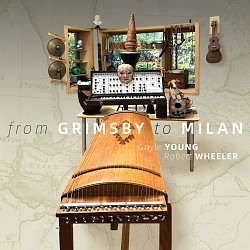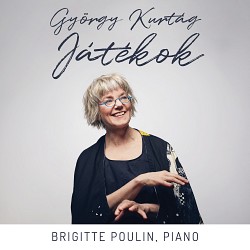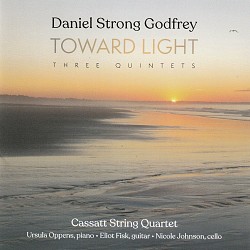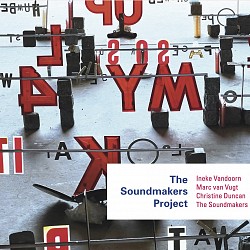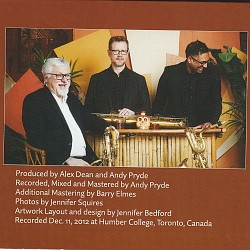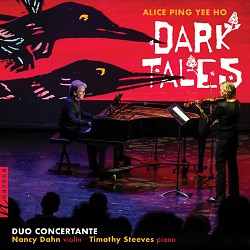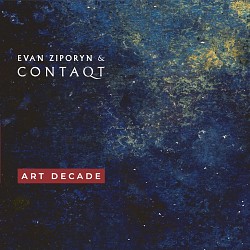The Possibility of a New Work for String Quartet - Warhol Dervish & Tim Brady
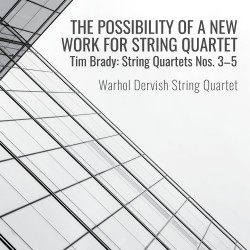 The Possibility of a New Work for String Quartet
The Possibility of a New Work for String Quartet
Warhol Dervish & Tim Brady
Leaf Music (leaf.music/leaf-music-tim-brady-and-warhol-dervish-string-quartet-present-the-possibility-of-a-new-work-for-string-quartet)
Listen
Track 1: String Quartet No. 5: I. —
Track 2: String Quartet No. 5: III. —
Track 3: String Quartet No. 5: String Quartet No. 5: I. —. —
Read the Review
Brady: New Music Concerts was not my first opportunity to meet composers in person and discuss their work, however. From 1984 through 1991 I was the host of “Transfigured Night” on CKLN-FM and in my first year of broadcasting I had the pleasure of meeting Tim Brady, an accomplished jazz guitarist who also composes for the concert hall. I believe he was the first guest on my overnight radio program. We discussed an album of his piano music recorded by Marc Widner on the Apparition label. This was the first of many encounters with this prodigious artist over the past 40 years, including a subsequent interview about his Chamber Concerto commissioned for New Music Concerts’ 15th anniversary event in 1986. There were numerous collaborations during my own tenure with NMC, most notably when we presented his opera Three Cities in the Life of Doctor Norman Bethune in 2005 and the evening-long multi-media creation My 20th Century in 2009. I also had the opportunity to perform in Brady’s Instruments of Happiness project While 100 Guitars Gently Weep – Concerto for George at Luminato in 2018, so my relationship with Tim is many-faceted.
In my column last issue, I speculated that Alice Ping Yee Ho may be Canada’s most prolific and most recorded composer, but I now realize that Brady’s output rivals hers, with some 30 CDs of his own, plus a dozen more that include his work. There are also four no longer available vinyl LPs, three of which are still in rotation on my turntable, including the abovementioned Music for Solo Piano.
2025 saw two releases, a double CD of solo (although many layered) works, For Electric Guitar (peopleplacesrecords.bandcamp.com/album/for-electric-guitar) and The Possibility of a New Work for String Quartet: Tim Brady String Quartets Nos. 3-5 which features the Montreal-based Warhol Dervish String Quartet (leaf.music/leaf-music-tim-brady-and-warhol-dervish-string-quartet-present-the-possibility-of-a-new-work-for-string-quartet). This album’s name is derived from the String Quartet No.3 “The (Im)Possibility of a New Work for String Quartet.”
Brady says “In March 2019 I woke up one morning with this idea in my head: It’s impossible to write another string quartet – so many have been written – there is literally nothing left to do with the medium. I needed to think of the string quartet not as a finished product (a score) but as a process for making music. So, I wrote a bunch of instructions on how the members of a quartet should compose their own quartet. These instructions are… ‘Write a fake folk tune,’ ‘Sustain notes in F minor’ ‘Make a big noise,’ etc.—it never tells them precisely where to go or what to do but jump-starts the collaborative process.” I find this iteration of the work – the players are instructed to tear up the score at the end of the performance to insure no two presentations will be alike – very convincing, and I was captivated by the “fake folk song,” a kind of a dirge reminiscent of some of the rustic children’s songs that Béla Bartók collected. Not having read the program note in advance, I had no clue that this wasn’t through-composed, it seemed so organic.
Since sketching the outline for that work Brady has evidently found a way to reconcile himself to the medium, and the two subsequent quartets are fully fledged contributions to the genre. Brady says String Quartet No.4 from 2020 is “quite sparse and transparent, and generally slow and meditative. I also use quarter-tone harmonies in a few places in this piece... It gives a soft, almost fuzzy feel to these chords which suits the reflective nature of the work.”
“#5 was also totally unbidden. I woke up one morning in October 2022 (near the end of the pandemic when we all had time to sit and ruminate on many things, including string quartets) and had this idea: a really big multi-movement string quartet with lots of notes and big contrasts—why not? Say 30 minutes: a good chunk of time, something that the players and listeners could really sink their teeth (ears) into. The plan is five movements—including two slow movements, with ample opportunity for the players to push their rhythmic agility and ensemble acuity. It’s a bit of a ‘chops-buster,’ but Warhol Dervish give an impressive performance.” And that’s true of all three works. By the way, Brady tells us that he has since written a sixth string quartet.
Regarding For Electric Guitar I’ll simply quote from the press release: “The three works it encompasses are all solo guitar pieces that he composed for himself to play. Throughout its 80+ minute runtime… Brady manages to embrace a plethora of styles and approaches with languid ambiences and textures, driving post-minimalist composition, nods to prog and jazz, and vital gestural moments that relate to modern concert music. The titular piece even echoes the format of a concerto, with Brady varying his tone to allow him to behave as both the soloist and ensemble.” It’s a striking achievement.
And if you found my mention of Brady’s 100 Guitars project intriguing you can check out the latest
Installment from the 2025 Brisbane Festival on YouTube (youtube.com/watch?v=Kqfjd4aAsO4&t=11s), where you can also find the George Harrison tribute (youtube.com/watch?v=3M_4_FTW1wY).

